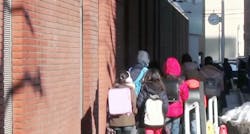Coronavirus threat prompts Japan to close schools nationwide
To combat the spread of the coronavirus, Japan's Prime Minister Shinzo Abe has asked all schools in the country to close for about a month.
The New York Times reports that the move to shut schools, which would make Japan one of a few countries, including China, to suspend classes nationwide, appeared to be an abrupt reversal of the more cautious stance the administration had taken on the virus.
Japan, unlike neighboring South Korea and other countries, has not experienced a sharp increase in reported infections. It has had 210 cases, including four deaths. There have also been more than 700 cases and four deaths from the Diamond Princess cruise ship, which spent two weeks quarantined while docked in Yokohama.
But global alarm — and questions about whether the Olympics in Tokyo would have to be canceled — has grown as the virus has spread more rapidly outside China. Abe’s actions began to reflect that concern on Wednesday, when he requested that large sports and cultural events be postponed or canceled in the coming weeks, a day after saying that such a move was unnecessary.
As he announced the school closings on Thursday, Abe said he was “putting a priority on children’s health and safety” and trying to pre-empt the risk of widespread outbreaks that could result “from gatherings of many children and teachers for a long time on a daily basis.”
The prime minister said that elementary, middle and high schools should remain closed through spring break. The Japanese school year ends in March, and the new year usually starts at the beginning of April. He did not mention universities or day care centers.
Analysts said the decision to close schools may have been influenced more by political calculations than science, particularly with the Olympics scheduled to begin in July.
“The Olympics have cast a shadow over the government’s response this whole time,” said Tobias Harris, an expert on Japanese politics at Teneo Intelligence in Washington.
“Early on, the response was a little timid and reactive for fear of alienating international visitors, and now they’re belatedly realizing that unless they can somehow stop this or contain it that the chances of cancellation seem to be growing by the day.”
Video from BBC News:
About the Author
Mike Kennedy
Senior Editor
Mike Kennedy has been writing about education for American School & University since 1999. He also has reported on schools and other topics for The Chicago Tribune, The Kansas City Star, The Kansas City Times and City News Bureau of Chicago. He is a graduate of Michigan State University.
